One by one, they took their turn, each sitting at their aunt's bedside in a Pittsburgh hospital room.
One by one, the four nieces and the nephew looked into their aunt's loving eyes for the final time. It wouldn't be long, they knew, before Carolyn Schmitt's body, which had endured so much for so long, decided it finally had enough.
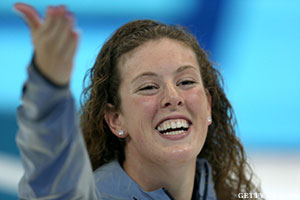
They had gathered together in Pittsburgh because they knew it was time. They understood when they said goodbye on that Sunday afternoon, it would be for good.
Allison Schmitt approached the bed where her favorite aunt lay, trying her hardest not to cry.
Oh, the tears came, but Schmitt, the 22-year-old swimmer whose Olympic glory wouldn't be fully realized until a magical week later with five medals in London, did her best to be brave.
In a family full of fighters, in a family that demanded that each member give their all in everything they did and in a family that had always refused to surrender to adversity, Schmitt looked at her Aunt Carolyn and prepared herself to share one final moment together.
As difficult as it would be would be, Schmitt relished the opportunity to sit with her aunt, the one who 10 years earlier had somehow managed to will her way to one of Allison's swim meets, one last time.
"She was just in so much pain ... I'm just lucky I was able to have the chance say goodbye to her," Schmitt says now, nearly two months after Carolyn Schmitt passed away at 63 from complications of rheumatoid arthritis.
After winning a bronze medal in the 2008 Summer Games, Schmitt had pointed toward London, expecting big things. But the eight-time NCAA champion, who had put her education and collegiate career at the University of Georgia on hold for a year to train for 2012, had no idea how her life was about to change.
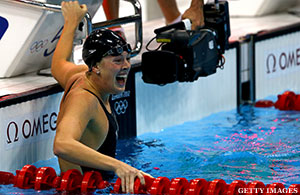
In London, in an Olympic Games dominated by American women, Schmitt -- known affectionately among her teammates and friends as "Schmitty" -- quickly emerged as one of the fresh new faces of U.S. swimming. Known for constantly smiling, Schmitt established a new Olympic record in the 200 freestyle and teamed with fellow Golden Girls Missy Franklin, Dana Vollmer and Rebecca Soni to set a new world record in the 400 individual medley relay.
Schmitt was now a star, widely recognized, although often mistaken for her teammate Franklin.
Within hours of landing back home in Michigan, Schmitt had been approached by a young fan who burst into tears at the sight of the Olympian, admitting she had always wanted to shake Schmitt's hand.
But as quickly as Schmitt had started adjusting to her newfound stardom, Schmitt's everyday existence as she knew it had actually began to change on that Sunday afternoon in Pittsburgh.
Schmitt had left Baltimore after a Saturday practice and took a quick flight to join her family. They gathered the next day at the hospital, where Carolyn Schmitt kept asking Allison how her swimming was going, focusing more on her niece than with her deteriorating physical condition.
Never once did Carolyn mention how she was feeling or what was coming in the time she had left. Instead, she used her final meeting with Allison to dwell on the excitement that was coming in her niece's life.
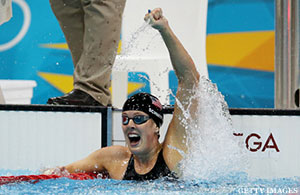
As she got ready to get up from her own one-on-one moment with her Aunt Carolyn, the woman Schmitt had always counted among her top supporters, grabbed her niece's hand.
"When you swim at the trials and at the Olympics, I'll be cheering for you from beyond the stars," Carolyn told her niece. "When you're hurting, look up because I'll be pulling for you."
Days before Schmitt raced for the first time at the Olympic Trials in Omaha, Carolyn's body finally gave in.
Ralph Schmitt, Allison's father and Carolyn's brother, braced himself, knowing he'd have to call his daughter and deliver the news.
For some time now, Schmitt's family knew the end was approaching and they prayed that the pain Carolyn had fought for much of her life would finally be taken away.
Carolyn had fought the rheumatoid arthritis since she was a child and over the years, the illness and the battery of medications had taken their toll. During her life, she had both hips replaced, neither of which was in place at the end because of the infections that had set in.
"Her body was just overwhelmed," Ralph Schmitt says.
It was a reality Ralph Schmitt had come to grips with when he gathered his wife and four children in Pittsburgh that weekend. As much as his daughter had to do before making her run for London in Omaha, Ralph couldn't let the opportunity pass to give Carolyn the chance to be there for Allison one final time.
Carolyn had always been part of Team Schmitt from the time when Allison had started swimming as a child to the times when she joined Club Wolverine in Ann Arbor, Mich., in high school to train under coach Bob Bowman and with Michael Phelps.
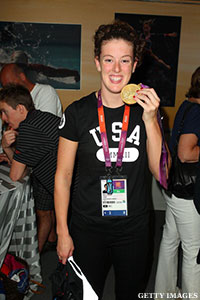
Over the years, Carolyn depended on Ralph Schmitt for regular updates, soaking up Allison's swimming achievements through newspaper accounts and televised races. As her condition worsened, Carolyn constantly reminded nurses and her fellow patients of who her niece was, extending the reach of what was already a tight-knit support system.
When Allison was 12, Carolyn Schmitt, then requiring crutches to get around, arrived at an age group meet to watch her niece swim at the University of Pittsburgh. But even making a simple crosstown trip wasn't easy.
The meet was being held at Trees Hall, which sits on a hill on Pittsburgh's campus. Given her physical condition and the difficulty she had always had with getting around, just making an appearance at the event was a challenge.
But as she looks back, Allison still cherishes the image of her aunt managing to work her way up steep staircases on crutches just for the chance to watch her future Olympian compete.
But now, 10 years later, Carolyn knew she couldn't be there the way she wanted and so she used that moment in her hospital room to leave Allison with her special parting message.
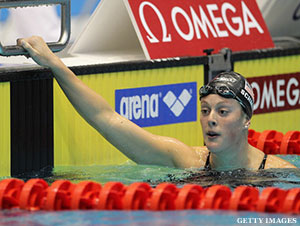
"My sister gave (Allison) the support she wanted to give her," Ralph Schmitt says, fighting back tears. "She knew she wasn't going to be here."
Allison Schmitt was in Colorado Springs preparing for the trials on the Tuesday when Carolyn passed away.
Ralph made sure someone could be with his daughter when he called to deliver the news.
As much as she was hurting, Schmitt remained focus on first the trials and then the Olympics, knowing her Aunt Carolyn would have it no other way.
"She knew my sister had given her the encouragement to go on," Ralph Schmitt said. "So that's what she did."
Schmitt arrived in London, unaware of success she'd discover during the Games' first week.
By the time the week was over, she had captured five medals (three gold, a silver and a bronze). In each of her five swims -- the 200 and 400 freestyle, plus three relays -- Schmitt kept Carolyn's memory fresh.
In the 400 free, in which she took silver, Schmitt made her final turn and immediately found herself thinking of her aunt. It was a strange moment, she admits. Here, in her longest individual swim of the Olympics, in an environment in which she is normally so focused, she couldn't help but think back to that private bedside moment with Carolyn.

Her body was hurting. But she remembered what Carolyn had told her, that in those times when she didn't know if she could go on, to look up.
In that instant, Schmitt pushed on, urging herself to keep surging forward.
"I knew she was pulling for me from the other side," Schmitt says. "I knew she had been in more pain than I could ever be in."
The final 50-meter stretch ended up being the fastest lap Schmitt swam in London. In that moment, she fought off defending Olympic 400 champion Rebecca Adlington of Great Britain, finishing in 4:01.77 -- a new American record -- to finish a half stroke behind France's Camille Muffatt.
The instant Schmitt reached the wall, she knew Carolyn had been with her, pushing her forward toward the wall.
From the stands, Ralph, who had traveled to London with his wife, Gail, and their other four children as well as his brother and sister, could sense it, too.
Each of Allison's trips to the medal stand was special. Gail Schmitt struggled each time to fight off tears, soaking in each of her daughter's Olympic medals.
After winning the 200 free, Schmitt had remained composed for the start of the national anthem before seeing the American flag raised in her honor became too much.
She'd always locate her family watching from the stands, often overwhelmed by the realness of the moment. Ralph stood surrounded by his wife and children but also warmed by the fact that he knew – in her own way -- Carolyn was there, too.

"It's special any time you're around your family, but I think as your own mortality is very visible to you, you think there's not too many more times," Ralph Schmitt said. "Hopefully, there's years, but you never know."
From the medal stand, Schmitt also savored the moment. She still has difficulty putting into words what it's like to hear her country's national anthem played in her honor.
And as big of a role as family had always played in her life -- in and out of the pool -- the fact she was surrounded by her support system in London made the experience even more meaningful.
Still, she sensed there was part of her missing. Deep down, Schmitt knew that if Carolyn could have been in London she would have been. But like in the final stretch of her 400 free race, Allison sensed her aunt's presence.
"Just knowing she had faith in me to make the Olympic team and to do well (in London) and knowing she was going to be cheering for me from the other side, it means a lot," Schmitt says. "I felt like I was able to accomplish a lot and I knew she was looking down on me the whole time."
This week, Schmitt was welcomed back to her hometown of Canton -- situated between Ann Arbor and Detroit -- which threw a homecoming rally in her honor. A park full of local residents cheered her return, waving miniature American flags and snapping photos with cameras and smartphones.
Schmitt arrived behind a police escort, which ushered her into an open-air party, celebrating the hometown girl's Olympic success. Schmitt, who wore one of her gold medals throughout the event, signed one autograph after another, stopping only to pose for photos with young fans, flashing the ever-present smile that had become almost as famous as the champion swimmer herself.
Like the Olympics, returning home to a hero's welcome was surreal for a swimmer who had learned to swim at a local swim club before shaping her craft with Bowman and long-time training partner Phelps.

Over the years, Schmitt and Phelps had established a special bond. They had become more than teammates, growing a brother-sister like relationship that helped Schmitt mature.
Just as her own Olympic career was beginning, Schmitt watched as Phelps' was coming to a close. Soon, the two became the other's biggest cheerleader, greeting one another with big embraces following each of their swims in London.
Phelps had pushed Schmitt to channel into her competitive side, one that had been shaped throughout her life by her family.
From the start, her parents had encouraged their children to chase their dreams, pushing them to reach beyond what they thought was physically possible.
Schmitt had done that in London, experiencing more success than she ever imagined when she left. She says each of her five medals carries special meaning, each representing the level of commitment she had shown since she first started setting her sights on Olympic gold.
She thinks back to when she struggled as a youngster, failing to win meet or state championships and just trying to picture herself in an event final –- never imagining it would carry over to the Olympics.

"I'm so proud of her," Bowman told reporters in London after she had completed her memorable weeklong run to five medals. "She came through and did exactly what we wanted. What more can you ask of somebody?
"Three gold medals, a silver and a bronze -- that's a big improvement in four years."
Schmitt will now turn her attention to returning to finish up at Georgia, unsure of how her life will continue to change. She will do her best to remain true to herself, unwilling to change, promising to be the same person she would have been had she returned from London with no medals rather than five.
She has already shifted her focus to 2016, when she'll again be one of the faces of American swimming. No longer will she be able to swim under the radar like she did coming into the recently-completed games, but will enter with a confidence knowing she's one of the world's best.
"I'm definitely thinking about Rio," Schmitt says. "I had a great Olympics (in London) and I had a lot of fun. I want to repeat it."
Schmitt will do so building off of her London experience and a work ethic established years ago. But she will also press on in a manner that would make Carolyn Schmitt proud, continuing to live with the memory of that final meeting with her aunt in Pittsburgh.
And when the times get tough and she's not sure whether she's got any more to give, Schmitt will pause and take a moment to look up.
"I'll say, ‘C'mon -- you can do this' ," Schmitt says, "Because I know my Aunt Carolyn is pulling for me."
And from there, knowing she has someone cheering her on from the other side of the stars, Schmitt will keep pressing forward, knowing that Carolyn Schmitt will never let go of her hand.
-- Email Jeff Arnold at jeff.arnold@thepostgame.com and follow him on Twitter @jeff_arnold24.








